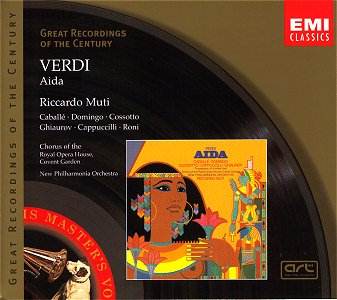This is Son et Lumière on the Electronic amplification
and Laser light scale. From the NEC to Cairo via Earls Court and Verona
the packed audiences demonstrate time and again that Aida has never
lacked performances. Epic scale, "hummable" melody and clever
marketing keep it at the forefront of public spectacle.
However Verdi wrote much more: a simple love triangle;
a daughter riven by love and duty; a deeply political if not Machiavellian
father; a princess driven to successive love lorn "u" turns;
and a simple warrior hero. The characters do not need to develop as
in other Verdi operas. He sets the human drama in the context of the
grand background and lets the music take over. As should we.
On this recording let the vocal sounds surround you.
Recorded over 25 years ago and recently re-mastered Montserrat Caballé
will delight your ears. There is not a false pause or a misplaced tone.
Positively there are some staggeringly delivered soft high notes produced
with no apparent effort. Her two "show" arias Ritorna vincitor
and O patria mia are justification for the purchase of this CD
alone. Conflict in one, nostalgia another, anguish in both, and all
so evident.
Combine that with Fiorenza Cossotto and the two voices
make for unforgettable interplay and duets. The descent of Amneris from
haughty princess to desperate unrequited lover is vocally faultless.
Her trial scene changes of approach are superbly delivered. It is such
a pity that her final lines from above the tomb are somewhat lost in
the ensemble.
Placido Domingo is in fine form and although I would
have expected more tonal contrasts than simple passion there are some
superb sounds. Against the female range, his role, but never his voice,
appears somewhat flat. Perhaps that is the simple warrior. That said
there is nothing simple about the vocal part of his role. His opening
aria is potentially painfully demanding particularly when, as here,
it is delivered at a quick-ish pace. Indeed I thought that that pace
detracted slightly from several scenes. Combine that with an almost
"punchy" orchestral delivery and there is a recipe for diminished
nuance and contrast. This seemed to be relevant in some of the ensembles
where sometimes the several contributions could not be distinguished
from the sum of the whole.
Amonasro takes us back to the intimate drama of the
opera. It is a splendidly devious role which is the lynch pin of the
plot. Every blackmail device is used by him, which no daughter could
withstand. While perhaps a little limited in tonal variation, so that
the wide spectrum of cunning is not evident, Piero Cappuccilli sings
with clarity of diction and rounded tone laying the foundations for
the tragic end.
In contrast Ramfis and the King are straightforward
roles of almost detached superiority. The Isis appointed battle commander
is exhorted to victory by the King and bloodthirstily blessed by Ramfis
and the Priests. These are vicarious warriors. Thus Nicolai Ghiarov
(Ramfis) and Luigi Roni (The King) display majestic vocal pomp and circumstance
in carrying forward the tide of militarism.
The Triumphal March is a Verdi spectacular. The Trumpeters
of The Royal Military School of Music lead us onwards and upwards in
a purity of sound delivered at a very quick march. That pace is taken
up by the orchestra which whilst exciting tends to diminish the grandeur.
Robert McKechnie

![]() Aida Montserrat
Caballé (soprano)
Aida Montserrat
Caballé (soprano) ![]() EMI Classics CMS 5 67613
2 [CD1: 39.44 CD2: 41.16 CD3: 65.27]
EMI Classics CMS 5 67613
2 [CD1: 39.44 CD2: 41.16 CD3: 65.27]